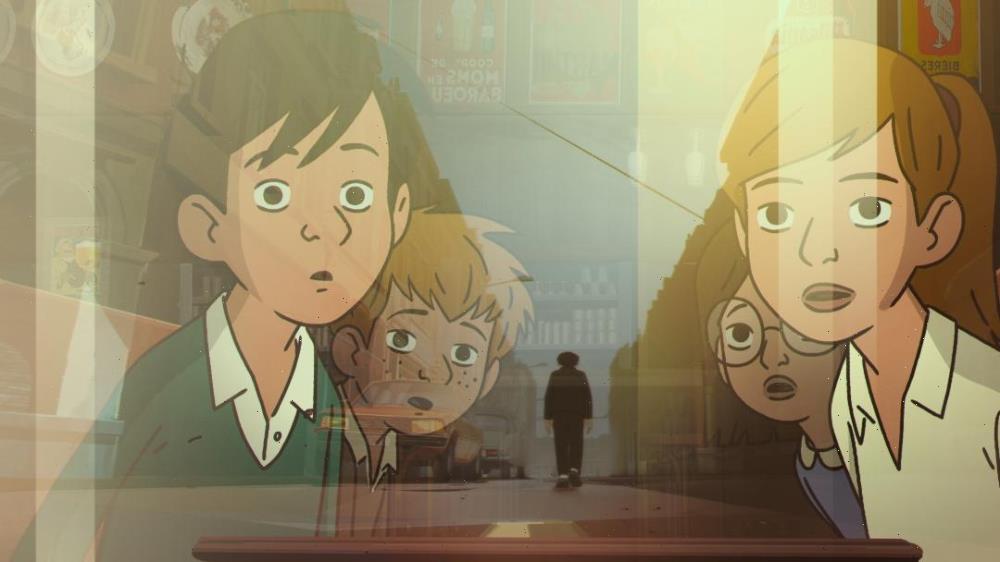
Holocaust Animation ‘My Father’s Secrets’ Set for Cannes Debut (EXCLUSIVE)
05/18/2022Encapsulating humanity’s weighty history and paths toward healing, director Véra Belmont (“Red Kiss”) takes a leap from live-action cinema to animated feature with her latest project, “My Father’s Secrets,” a Holocaust story that tackles generational familial trauma and redemption.
Based on the graphic novel “Second Generation” by Israeli illustrator Michel Kichka, the film is set for its market premiere at the Cannes Marché du Film, with the incentive for international markets of Elliott Gould leading the English voice cast.
“My Father’s Secrets,” set in Belgium, introduces two young brothers, Michel and Charly, who struggle with their father Henri’s reclusive nature surrounding his time at Auschwitz.
Their imaginations get the better of them as their father retreats inward on a personal journey to recoup his life after surviving the tragedies of internment. They hypothesize, snoop and act out in response, causing familial friction.
Sold by Simon Crowe’s SC Films in international markets and distributed by Jean Labadie’s Le Pacte in France, “My Father’s Secrets” presents a relatable story of a family struggling to understand one another.
“What attracted SC Films to this was a combination. We just had a very good relationship with some French producers that are known for making high quality independent animation features, ‘Yellowbird,’ ‘White Fang’ and ‘Pachamama,’ in particular,” said Crowe.
“They’ve been very successful for SC Films and released around the world. When I met Marc and Vera Belmont in Cannes many years ago, what I liked about the story was that it was a very compelling story, a very sweet story but with this very important message,” he said.
A co-production between Marc Jousset and Perrine Capron of France’s Je Suis Bien Content (“Persepolis”) and Belgium’s Left Field Ventures (“Madame Bovary”), the film fuses tragedy with the innocent and comical nature of children questioning the narrative, growing up in the shadows of war.
Often portrayed via documentary and dramatic cinematic formats, Belmont and Jousset agree that animation was the only choice in depicting the Kichka family story. As with Kichka’s illustrations, this format allows gentler, broader access to the topic.
“The choice of animation wasn’t without thought. Indeed, through its elegance and precision, drawing allows us to represent the ‘unrepresentable’ and to tackle the most serious issues with lightness and humor, following the example of Art Spiegelman’s ‘Maus.’ This distance is necessary in order not to overwhelm the spectator with pathos, to give him the opportunity to laugh and reflect,” Belmont said.
Jousset added: “Animation enables us to tackle very heavy and serious issues with a distance. It’s broader, you can reach different audiences because animation enables us to be close and universal, thanks to the drawings, but to maintain a distance from the topic. Children can easily enter into the stories through the animation. We saw this with ‘Persepolis.’ The subject matter was very strong but, thanks to animation, we could tackle this subject.”

The film uses a mix of 2D characters against 3D backgrounds to pay homage to Kichka’s style, creating a crisp, clean, yet nostalgic view. The color scheme and sleek lines harken to the post-war era as protagonists glide past static storefronts and dated architecture.
“The design is quite different in the movie from the graphic novel, but we wanted to keep the traditional 2D design from the graphic novel in the film. We have some 3D elements, like the backgrounds, that remain in 3D which can bring a bit of a modern look to the film, but we keep the characters in 2D. Thanks to that, we can keep the spirit of the graphic novel,” remarked Jousset.
In essence, the project is a first person account of a family on the brink of collapse, a coming-of-age tale marred with mystery and tragedy that brings in common themes of finding the self, forgiveness, and calls to higher action. In keeping true to Kichka’s vision, writers Belmont and Valérie Zenatti aimed for accuracy while ensuring the ultimate artistic say.
“We’re very accurate on nearly every level but did take some liberties with it, so there are differences between the film and graphic novel but we tried to stay quite faithful to the core spirit of Michel’s work and had discussions with him surrounding the direction we took,” said Jousset.
Belmont went on: “Michel Kichka never had any involvement in the writing. He trusted us completely and I thank him for that. Valérie Zenatti, my co-writer, who is also a very good writer, and I wove the adaptation together with great pleasure and love. As we wanted to focus on the children, we allowed ourselves to take some liberties with the book. Later, when we were working on the storyboard, I made a few changes to adapt the subject matter for animation, to make it even more coherent.”
In the end, the story shows just how important art was in the essential healing work of a family unit. A father taught his son to draw. That son wound up a world-class illustrator, ambitiously communicating his family’s story beyond the hard facts of confinement, delving deeply into the intimate spaces of his childhood dwelling, the recoil, and the reconnection that transpired within.
“In his graphic novel, Michel Kichka tells the story of his father, Henri, being himself a great cartoonist. It was his way to transmit, through drawing, all of the memories from his past. Henri couldn’t speak directly to his children about his memories but found this way through drawing to talk to Michel and to express himself, what he felt,” Jousset mused.
“My Father’s Secrets” is a keen study of the heroic and revolutionary nature of healing and reconciliation and the tale of a man inching forward, trying to come to terms with a past that haunts him to take control of his narrative at an increasingly high cost to those who love him.
The French version of the film casts celebrated talent Michèle Bernier (“The Demon Stirs”), Jacques Gamblin (“The Names of Love”), and Arthur Dupont (“Victor & Célia”), while the English production had Gould (“The Long Goodbye”) to voice Kichka’s father.
On the film’s forward trajectory, Jousset concluded: “Jean Labadie and Simon Crowe tried to be selected in prestigious festivals so we can get great exposure for the movie. We have Cannes and Annecy and hopefully another which is in late August so we can push ourselves into the release which will be Sept. 21.”

Source: Read Full Article

